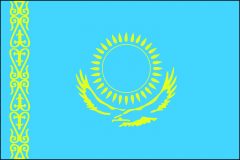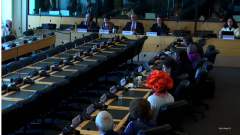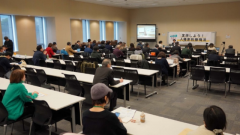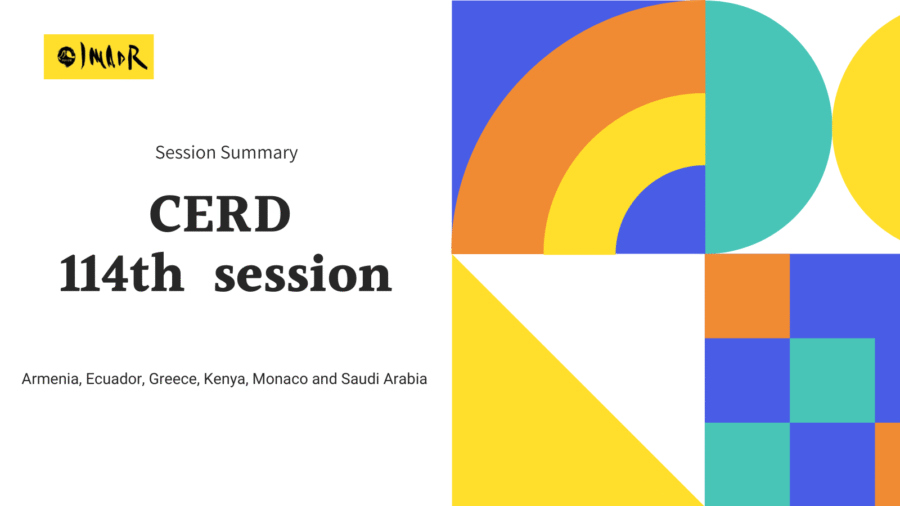CERD 106th session summary: Cameroon, Estonia, Kazakhstan, Luxembourg
May 10, 2022
From 11th to 29th April 2022, the UN Committee on the Elimination of Racial Discrimination (CERD) held its 106th session. During the session, the Committee reviewed and adopted its concluding observations on Cameroon, Estonia, Kazakhstan and Luxembourg.
In accordance with its follow-up procedure, the Committee considered follow-up reports of Czech Republic, Ireland and Peru.
Under its Early Warning and Urgent Action procedure, the Committee adopted a statement on the lack of equitable and non-discriminatory access to COVID vaccines.
Under the individual communications procedure, the Committee adopted a decision on the communication 59/2016 concerning Sami petitioners versus Finland, concluding that the petitioner’s right to political participation was violated by some of the rulings of the Supreme Administrative Court that had the capacity to artificially modify the electoral constituency of the Sami parliament. The Committee also adopted a decision on the communication 61/2017 concerning Yaku Perez Guartambel vs Ecuador, concluding that the State party must refrain from prohibiting the celebration of indigenous marriages and also take all necessary measures in cooperation with traditional authorities to enter them in the civil register.
The Committee also decided to to establish a taskforce with a mandate to improve the Committee’s working methods.
Concluding observations, reports of the States parties and other stakeholders are available at the OHCHR website. Video archives of the public meetings can be accessed at UN Web TV.
 Cameroon
Cameroon
The Committee expressed its concern about the lack of comprehensive statistics on the demographic composition of the population, disaggregated by ethnic or national origin and language spoken, including on indigenous peoples, internally displaced persons, migrants, refugees and stateless persons, and on the socioeconomic status of the different population groups. It also regretted the lack of information on the invocation and application of the Convention by domestic courts. Concerns are also raised over the lack of explicit definition of racial discrimination and the fact that direct and in-direct racial discrimination in public and private spheres is not prohibited expressly. While the establishment of the Cameroon Human Rights Commission in 2019 was a positive step, it still lacks the institutional independence and adequate level of funding and human resources. There was no updated information on the complaints of racial discrimination received by the abovementioned Commission, nor on investigations, prosecutions, convictions and sanctions imposed by domestic courts and on the reparations and redress provided to victims. Particular concern is raised over the lack of the criminalization of racist hate speech and hate crimes as well as over the spread of hate speech on the Internet and social media. Human rights defenders, in particular those working on the rights of ethnic, ethno-linguistic, ethno-religious groups and indigenous peoples, have increasingly become targets of killings, enforced disappearance, threats, intimidation, reprisals and harassment. Ethnic and ethno-linguistic minority groups and indigenous peoples in the North-West and South-West regions are still facing inequalities, widespread violence, lack of security as well as grave human rights abuses committed by security forces under the counter-terrorism measures and by non-State armed groups. Legislative framework on land ownership and compensation remains inadequate as it does not take into account the traditions, customs and land tenure systems of indigenous peoples. The number of children without birth certificates and persons without identity documents is still high, while there are shortcomings in the administration of the civil registry system including corruption, high costs and complex procedures, which is also affecting the internally displaced persons who lost their identity documents. The Committee also regretted the lack of information on guarantees against non-refoulement and on the ability of refugees and asylum seekers to access basic services, including health care services and education.
In its concluding observations, the Committee issued recommendations on the following topics (Recommendations with asterisks [*] are the ones selected for the Committee’s follow-up procedure):
- Statistics;
- Convention in the domestic legal order;
- Prohibition of racial discrimination;
- National human rights institution;
- Complaints of racial discrimination;
- Hate crimes and hate speech;
- Human rights defenders and civil society organisations;
- Situation of minorities and indigenous peoples*;
- Special measures to address inequalities in the North-West and South-West regions;
- Situation of ethnic, ethno-linguistic, ethno-religious groups and indigenous peoples in the context of crises and security situation;
- Situation of ethnic, ethno-linguistic, ethno-religious groups and indigenous peoples;
- Land rights;
- Internally displaced persons;
- Birth registration and identity documents*;
- Refugees and asylum seekers; and
- Training, education and other measures to combat prejudice and intolerance.
Cameroon is requested to submit its follow-up report by 29 April 2023 and its next periodic report (combined 24th-27th) by 24 June 2025.
 Estonia
Estonia
The Committee expressed its concern over the lack of statistics on the enjoyment of economic and social rights by persons belonging to various ethnic groups and on the representation of ethnic minorities in political life. It also remains concerned about the the persistently high number of persons with undetermined citizenship. Particular focus was put on the issue of the language, such as the promotion of Estonian language proficiency including in school education, punitive elements involved in the language promotion especially in the area of employment, restriction on the use of minority language in public administration, lack of self-identification principles for minorities, and discrimination based on the language proficiency. The Penal Code is not fully compliant with the Convention, in particular with regard to prohibition of racist organisations, as well as addressing hate speech and hate crimes, whereby racial motivation does not in general constitute an aggravating circumstance in proceedings under Estonian criminal law and a comprehensive anti-discrimination legislation is still lacking. Concerns are also raised over the situation of refugees and asylum seekers, such as poor living conditions and the lackof comprehensive strategy and policy framework. The high number of non-Estonians among the prison population, which includes a significant ratio of persons of undetermined citizenship is another source of concern. Cases of intolerance and discrimination against people perceived to be of Asian descent were also reported in the early phase of the COVID-19 pandemic.
In its concluding observations, the Committee issued recommendations on the following topics (Recommendations with asterisks [*] are the ones selected for the Committee’s follow-up procedure):
- Statistics;
- Domestic legal framework;
- The Gender Equality and Equal Treatment Commissioner and the Chancellor of Justice;
- Persons with undetermined citizenship*;
- Language policies;
- Discrimination based on language proficiency*;
- Legislation regarding hate crime and hate speech*;
- Complaints of racist hate speech and hate crimes;
- Racial motivation as an aggravating circumstance in criminal law;
- Anti-discrimination legal framework and its enforcement;
- Provision of free legal aid;
- Education of Roma children*;
- Refugees;
- Prison population; and
- Impact of the Covid-19 pandemic.
Estonia is requested to submit its follow-up report by 29 April 2023 and its next periodic report (combined 14th-17th) by 29 August 2026.
 Kazakhstan
Kazakhstan
The Committee regreted the lack of comprehensive statistics provided on the social and economic situation of the ethnic groups living in the State party, including on persons of African descent. A comprehensive anti-discrimination legislation, which includes a definition of direct and indirect discrimination and establishes liability for acts of racial discrimination, is yet to be developed, while several sectoral laws include provisions prohibiting racial discrimination. The Committee was also concerned about the independence of the Commissioner for Human Rights and its insufficient work on the racial discrimination. Particular attentions was paid to the overly broad provisions of article 174 of the Criminal Code, which may lead to unnecessary or disproportionate interference with the right to freedom of expression, including of ethnic minority groups, and to the article 13 of the Media Act, which may disproportionalityinterfere with the right to freedom of expression of the media. The Committee is concerned that racist hate speech on the Internet and on social media against ethnic minority groups is increasing and contributes to ethnic violence, while Kazakhstan’s Criminal Code is not in full compliance with the ICERD article 4, and that tensions between ethnic groups is still existing and incidents of inter-ethnic violence continue, including the situation of Dungan community. It is also reported that official discourse, including in school curricula, makes a distinction between autochthonous ethnic Kazakhs, and other ethnic groups that are referred to as “guests”, and that ethnic minorities are poorly integrated and not represented proportionately in public decision-making bodies and in the civil service. The Committee is also concerned by reports that children whose parents do not possess valid registration or other documents have difficulty accessing primary and secondary education, and by the low number of students with ethnic minority background in postsecondary education. Abuse and exploitation of migrant workers was another source of concern. The number of persons subjected to forced labour and sexual exploitation continues to grow, whereby complicity among some law enforcement officers in human trafficking is also reported.
In its concluding observations, the Committee issued recommendations on the following topics (Recommendations with asterisks [*] are the ones selected for the Committee’s follow-up procedure):
- Statistics;
- Anti-discrimination legislation;
- The Convention in domestic law;
- Intersecting forms of discrimination;
- National human rights institution;
- Freedom of expression;
- Racist hate speech*;
- Legislation against incitement to violence and extremist organizations;
- Tensions among ethnic groups;
- Dungan minority;
- Roma;
- Kazakh identity;
- Minorities in political and public affairs;
- Education*;
- Minority languages;
- Migrant workers;
- Human Trafficking;
- Refugees and asylum seekers;
- Stateless persons; and
- Access to justice.
Kazakhstan is requested to submit its follow-up report by 29 April 2023 and its next periodic report (combined 11th-14th) by 25 September 2025.
 Luxembourg
Luxembourg
Noting the increasing population mainly due to the immigration, the Committee raised questions about the lack of data on ethnicity including on measures taken to support non-national in obtaining housing. It also requested more information on awareness raising campaigns about racial discrimination. Concerned about the increase of racial hatred in the media and online, particularly against refugees and asylum seekers, the Committee asked about measures to prevent online hate speech, to recognise racial discrimination as an aggravating circumstance and to ban organisation inciting racial hatred. The Committee expressed its concern over the barriers to make complaints about discrimination including high legal fees. Questions were also asked how the Convention is applied in the domestic courts. The Committee also questioned about the higher number of drop-out of non-national students in the secondary education and the higher level of poverty among non-national population. Concerns are raised over the living condition of asylum seekers including the lack of access to social housing and frequent eviction. Concerning that there is no specific legislation about the statelessness, the Committee asked about measures taken to address the statelessness. The Committee also raised the concern about the discrimination against people of African descent and asked whether equality is being considered in the Constitutional review.
In its concluding observations, the Committee issued recommendations on the following topics (Recommendations with asterisks [*] are the ones selected for the Committee’s follow-up procedure):
- Statistics;
- Constitutional prohibition of discrimination;
- Application of the Convention by domestic courts*;
- Legislation against racial discrimination*;
- Institutional framework;
- Conformity of criminal legislation with the article 4 of the Convention*;
- Racist hate speech;
- Situation of non-nationals in particular migrants, refugees, asylum seekers and stateless persons;
- Discrimination against people of African descent;
- Complaints of racial discrimination; and
- Education and training to combat racial discrimination.
Luxembourg is requested to submit its follow-up report by 29 April 2023 and its next periodic report (combined 21st-24th) by 31 May 2025.
Follow-up procedure TBC
Czech Republic: The Committee … .
Ireland: The Committee … .
Peru: The Committee adopted ….





